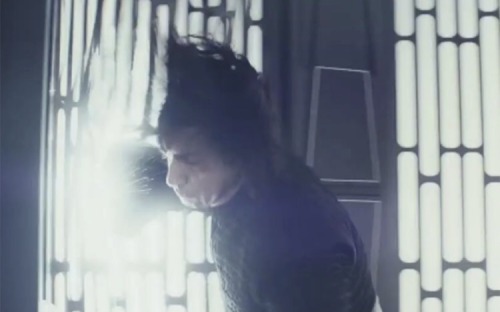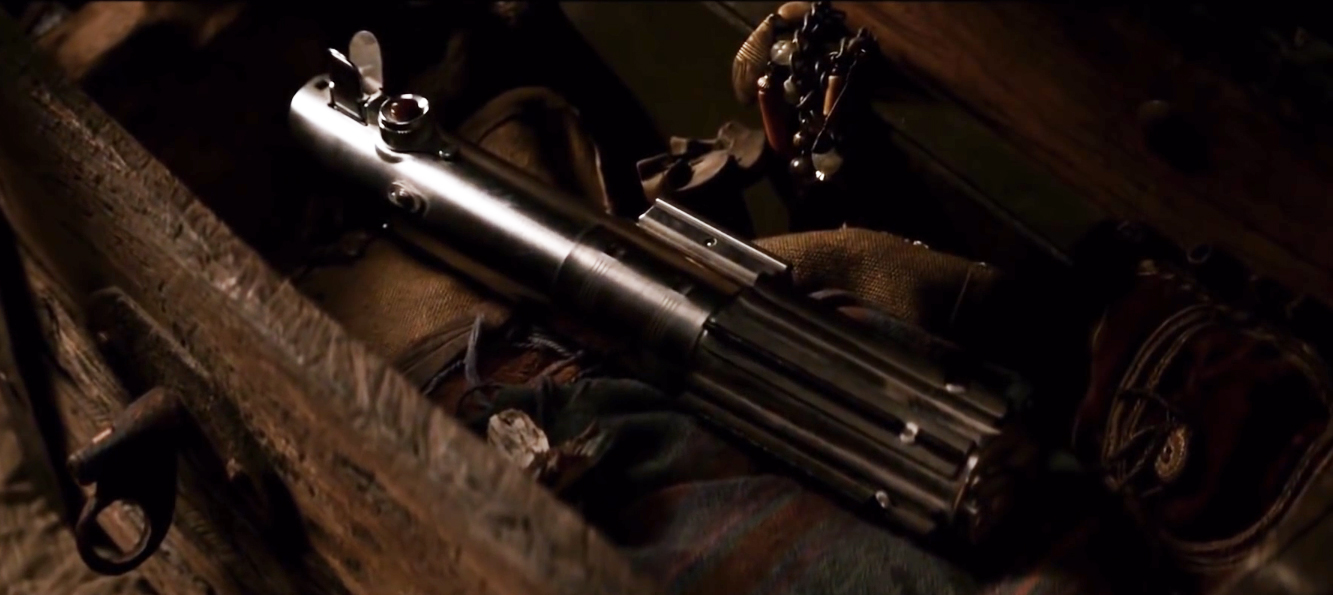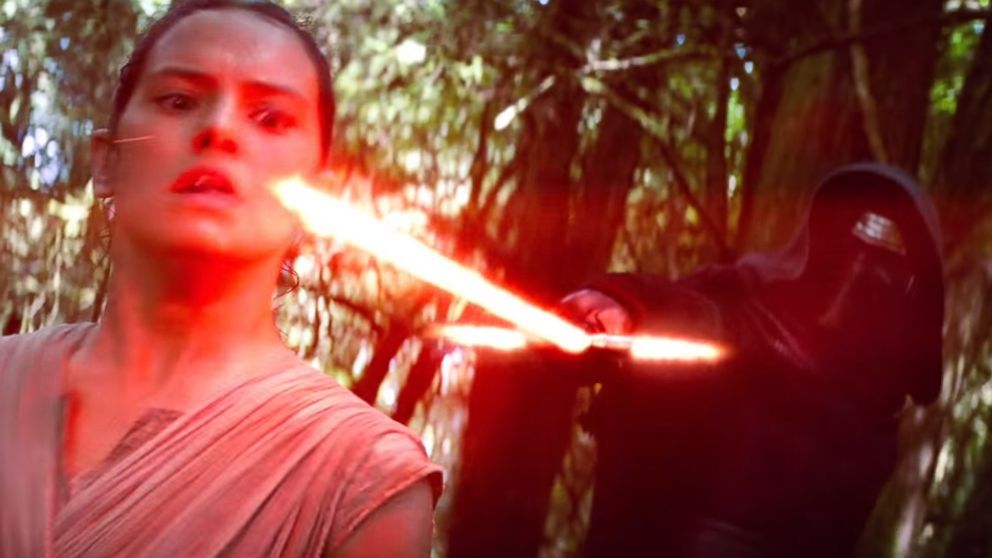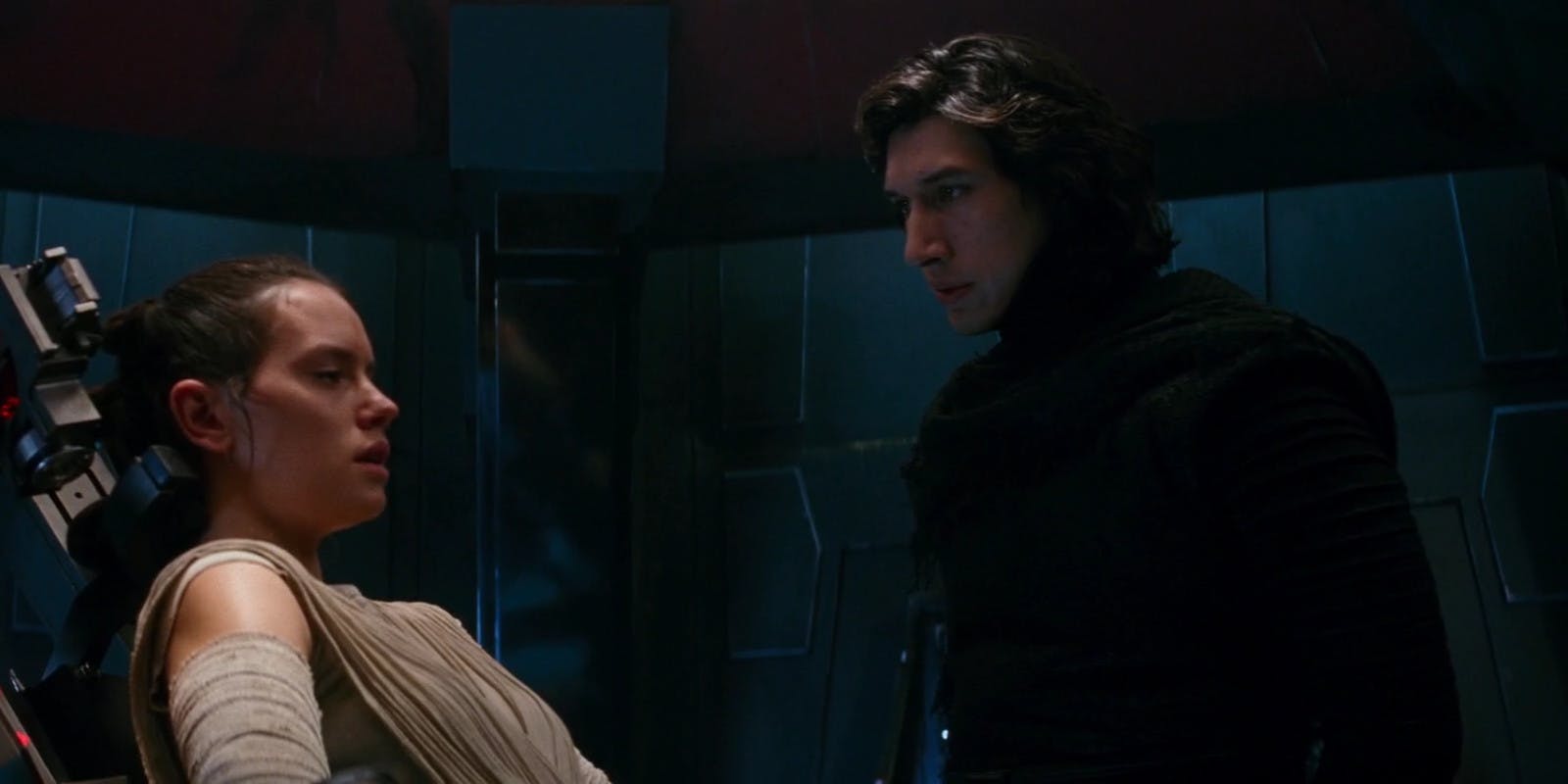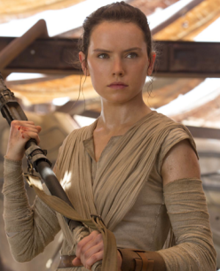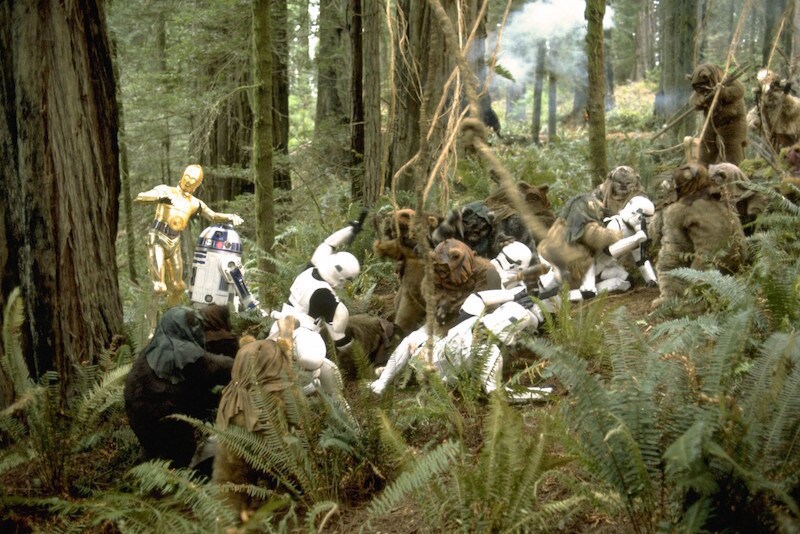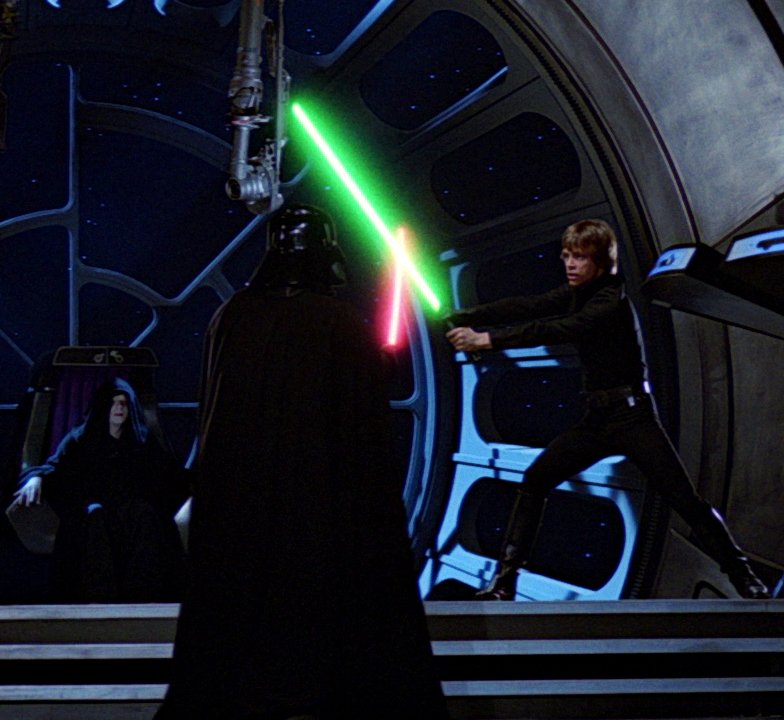The subversion part of a Star Wars episode always tells us something definitive about the characters. By the time you're done with the subversion part of an episode you will have encountered the emotional core of all the characters, what they'll come back to time and time again. When in doubt the characters of Star Wars will always act upon what you see in the subversion part of the subversion chapter of their trilogy. So what do we learn here?
Starting with Rey, we learn of her wish to define herself by her relationships, without having to reflect upon who she is. Unable to find an interior reference point she leans on Luke Skywalker, who obviously wasn't having anything to do with that nonsense. Ben is right to call her out on this weakness. If you can't be alone with yourself then who can you really be alone with? Well, as Rey finds out, nobody. Rey goes to the dark place in the island, which pulls her in. Since no one can teach her what she wants to know Rey reaches out to the darkness and finds.... herself. This sends her back, terrified, to Ben. She reaches out to Ben from the right, in an effort to end their loneliness, only to be stopped by Luke. Rey tries to reach through to Luke but ultimately abandons him, disgusted by her mentor's inability to move beyond his own perceptions to the need right in front of him. And, refusing to be perturbed by Luke's hatred of the Jedi, she takes the books with her.
Finn, Poe, and Rose, meanwhile, are so defined by their own compasses that they create disaster by ignoring the situation around them. They don't really care about what others say, they're going to do what they're going to do and to hell with everyone else. While they want to step up and be heroes these three just can't imagine a world where they may have to stop, look, and listen to other people. This issue is what Finn's conversation with DJ revolves around: there is more going on than Finn would like to know about. The galaxy knew that the First Order was coming and not only didn't care but profited off of it! The galaxy does not care who is in charge by this point. But Finn doesn't seem to take this into account. Like Anakin, Finn only cares about saving those right in front of him, regardless of how others think they should be saved. It's this tragic tendency to overly rely upon one's self that leads to the destruction of all the shuttles. Most haters of TLJ complain about how pointless this particular set of arcs are, but in doing so they miss the point of what the film is trying to say. Far from being pointless it's the arc that ultimately sets up the message: we learn from our failures far more than our successes. And these protagonists have a lot to learn from, given how much they fail in this chapter!
Finn's failure in particular requires a closer look. But first:
And then this:
Before getting to Kylo Ren and the death of Snoke I find that I have to address my least favorite part of arguing The Last Jedi: the jump into hyperspeed by Holdo. First off, let's get one thing out of the way: this was not a move done on purpose. Holdo, far as she was concerned, was going to do minimal damage to the Super Star Destroyer, assuming she did any damage at all. And that is, in fact, what happens. She bounced off the front. However, if you noticed, the Raddus's shields, when hit by turbolasers in the rest of the movie, flare differently than others. When dropping into hyperspace these experimental (and unique) shields reacted similarly to the Starkiller Base weapon, ripping hot plasma and debris through the fleet. You can see this as either the Force taking care of everyone or as an incredibly convenient plot armor. After all the other ridiculous thing that have happened in Star Wars you're only questioning the plot armor effects of the Force now? Somehow I feel it's a little late for that. That being said, the fact that this isn't better explained is really the only issue I have with The Last Jedi.
Kylo Ren's twist is one that I'd called... sorta. After recalling all the points of 2 and 5, back to back, and seeing The Last Jedi trailer I found myself knowing that Kylo Ren and Rey would team up and that maybe even Kylo would switch sides. Johnson, of course, played it out differently: Ben does kill Snoke (which checks off a promise that 2 and 5 try to fulfill and fail), but does not switch sides. His offer to Rey to destroy the Resistance and remake the galaxy comes from the left, and that's just...weird.
So what exactly is going on here? Keep in mind that Ben is, before all other things (like mass murderer, father killer, and all around jerk), a victim of abuse and manipulation. Snoke had been manipulating him from afar for decades, possibly all of Ben's life. Imagine if someone was constantly poking into your head and twisting everything you see and feel for decades, and all of a sudden you catch him admitting to it, ala the mind connection with Rey. Your whole life has been revealed to be a blatant manipulation by some scarred jerk in a gold robe. So you kill the dude, wanting to be free. But your attempt to be free is colored by the person you're trying to break free from, right? Your whole life has been defined as power and blood and fatalism and all things awful. So, when you try to break free, you do it the only way you know how. This is why Rey's refusal and attack of Ben comes from the right: she mistakes Ben's attempts to become free for an act of malice and, furthermore, turns Ben back to malice by her offensive effort. It's tragic and ill-done on Rey's part. But, with Ben knocked out, Rey chooses to let him live. She gives him another chance.
This is all encapsulated in Luke's conversation with Yoda. Luke, in his years of depression and trying to fight himself, had forgotten the very essence of what it means to be a hero: to be born into a situation that only you can change. It matters little what the far reaching effects of your actions are, because there's very little you can do to affect any of that. Luke is trying to keep the Sith from coming back, because wherever the Jedi are the Sith will inevitably follow. In refusing to come to his friends' aid Luke has finally caved into the bad advice that Yoda had given to Luke so many years ago: to sit it out, to allow the fight to go on without him. But Yoda learned a valuable lesson from Luke that day, and so he reminds Luke of what he knew so many years ago: do what you can, with what you have, for whomever is closest to you. The rest of it? There is no controlling it.
For those of you who look at this scene and go "But what about him destroying the tree and claiming that the books aren't page turners and ORGANIZED RELIGION IS BAD AND HOW DARE YOU SAY SOMETHING LIKE THIS"..... relax. Take a deep breath. Yoda knows that Rey has already taken the books. Yoda is trying to get Luke to let go of associating himself with the Jedi Order. What, don't believe me? How many times does Luke talk of himself in the same sense he does in the Order? It's throughout the movie. Post-ROTJ Luke has, not unreasonably, conflated himself with the Jedi Order. Yoda, by torching the tree, shows Luke that he will survive without the emotional crutch. Luke, all the way back in IV, had resolved to become a Jedi as a way to avoid the trauma of losing his aunt, uncle, father, and students. Don't believe me?
 |
| Luke deals with his aunt and uncles death by resolving to become a Jedi. |
 |
| Luke mourns his father's death and is comforted later by Jedi. |
 |
| Luke loses his temple by thinking like a Jedi |
 |
| Yoda tells Luke to let his idea of the Jedi go. |
For the first time in Luke's life, someone is with him in the death of something dear to him (No, Artoo does not count. Artoo cannot help Luke process). This scene is not about destroying the Jedi Order, it's about Luke finally being able to mourn all the horrible things that happened to him. Yoda understands and gives Luke the one thing he's craved his entire life: closure. In death Yoda has finally evolved to be what he was always meant to be. I would say that this is the most beautiful scene in Star Wars for me, but that's coming up. I can't wait to write about it.






